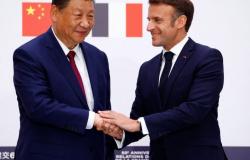II spoke this week with a close advisor of Ukrainian President Zelensky. And that scared me. “I – and certainly not only I – am slowly losing my confidence in him,” said the advisor, who wants to remain anonymous.
“Two years of war have made him a different person. At first it was a blessing; the man who brought together and inspired Ukraine. Now he is in danger of becoming an obstacle. The mood in Ukraine has changed, people are – quite understandably – exhausted. Paralyzed by the endless stream of victims and bombings. Above all, Zelensky is incredibly stubborn. Only the complete victory over Russia counts. But what does that victory mean when we are all hanging in the ropes? And yes – perhaps a leader in wartime should be rücksichtlose à la Churchill and his ‘we will fight them on the beaches’. But shouldn’t we also be more creative in finding a solution? Anyone who brings that up will immediately be criticized.”
It’s a race against time. Every day, Russian soldiers advance further into eastern Ukraine with a clear focus on Kharkiv – the country’s second city. At the expense of many troops, Ukraine is maintaining the lines as best as possible – pending American military aid that has finally been promised. Zelensky hopes that the $60 billion support package will be a turning point and that the Ukrainian army can regain the initiative with a new shipment of ammunition, long-range missiles and F-16s and thus drive the Russians out of his country. But how realistic is that? And what if this new support package literally goes up in smoke and the Russians still continue to attack?
At the front, Putin has the wind behind him in everything. Despite the 300,000 dead and wounded soldiers, there are now more Russians’boots on the ground‘ than at the beginning of the war. And the Russians operate a lot smarter. The images of exhausted Ukrainian soldiers who can only fire a handful of grenades a day while the Russians fire at least six times as many are eagerly shared on Russian TV. Moscow has been bombing Ukrainian infrastructure and residential areas with impunity for weeks now due to a lack of air defense. Kharkiv is in darkness.
“Ukraine is heading for defeat,” journalist Jamie Dettmer reported Politico from the front. “Troop morale is abysmal, under constant fire and Russian suicide attacks, lack of weapons and terrible casualties. A catastrophe is looming here.’
Ukrainian commanders stressed that another 500,000 men must be mobilized to sustain the war. And yet hardly anyone reports to a recruitment center, the trains to Europe are a third full of men and, according to EU figures, 860,000 Ukrainian men between the ages of 18 and 60 are now in Europe. Zelensky now wants those men to return to fight for their country. He has instructed his embassies to do something about this. That will be a difficult dilemma for European authorities. Should we send Ukrainian men back to Kyiv?
The new American aid package can hopefully break that negative spiral and give the Ukrainians a second wind. Especially since the coming year is also crucial for Russia. Russia is rapidly depleting Cold War supplies. These seemed almost inexhaustible, but according to military specialists, the bottom is now in sight. Even if Putin has transformed Russia into a war economy, Russia is still far from being able to meet its own military needs. Just as Ukraine is dependent on the West, Russia is becoming increasingly dependent on the China-Iran-North Korea axis. As a result, the war is also taking on more and more geopolitical dimensions.
So far, the axis has proven to be a more reliable ally in arms supplies than the West. Mainly thanks to Russia’s deep pockets. And therein lies perhaps the West’s greatest failure. The sanctions have ended in failure. Europe and the US consistently speak with two mouths when it comes to the economy. In April alone, Russia collects 14 billion in oil revenues – double the amount compared to last April! It is difficult to compete against a country that has so many billions at its disposal.
Greek tankers sail back and forth with Russian oil. The Western Scheldt turns out to be the ‘gas station’ for Russian ‘shadow tankers’ that stock up on diesel under a dark flag to continue their way. We look at it but do nothing.
French multinationals such as Auchan and L’Oréal are happily doing business in Russia. The Austrian Raiffeisenbank records billions in profits. Unilever, Nestlé and Pepsico keep their factories running. And many of the thousand Western companies that left Russia with much fanfare appear to still be doing business through the back door. About 300 billion euros in Russian (mainly state) assets are still in the Belgian Sint-Joost-ten-Noode with Euroclear. Transferring that amount to Ukraine would be a game changer. Ukraine doesn’t even get the interest yet.
This means you can continue mopping with the tap open. The Russians can also hope that – with the presidential elections approaching – this is the last American aid package. If so, then Ukraine is completely at the mercy of European whims. The delivery of a few Patriots is already proving to be a challenge. This is certainly not getting any better with the right-wing wave in Europe – fueled by the Russians.
That is why more and more policymakers in Kyiv are asking for a plan B. But how do you negotiate with Putin who will not settle for anything other than the complete destruction of Ukraine as a nation? ‘Do not negotiate with Putin,’ Hugo Vijver – ex AIVD – wrote NRC. “A democratic, flourishing, independent Ukraine on the border with Russia is a threat to the KGB’s Putin’s position of power and absolutely unthinkable.” Good point. But without the absolute and total support of the West – which is not there – this advice is of little use to Ukrainians.
British historian Sergey Radchenko caught up in a controversial article Foreign Affairs the ‘Istanbul Communiqué’ from the closet. Shortly after Russia’s invasion of Ukraine at the end of March 2022, an agreement between Ukrainian and Russian negotiators seemed within reach. The essence was Ukraine’s neutrality, no NATO membership, but a green light for EU accession and a period of 15 years for consultations on the status of Crimea. Essential point: all permanent members of the UN Security Council and other major countries such as Germany, Canada, Poland and Italy guaranteed the territorial security of Ukraine, including militarily. It never came to signing. Whether Putin really gave the mandate to the Russian negotiators is unknown (and Russia was still on the defensive at the time). Zelensky resigned after the Russian massacre in Butcha.
“No matter how complicated, at some point we will have to sit down with Russia,” sighed Zelensky’s adviser. “With the American support package we are stronger again. Let Zelensky use this moment to come up with a new plan B.”
Derk Sauer is publisher of The Moscow Times and columnist at Het Parool. He is also the founder of the Russian newspaper Vedomosti and former publisher of RBK Gazeta.
Tags: shocked closest advisor told losing confidence Zelensky
-





